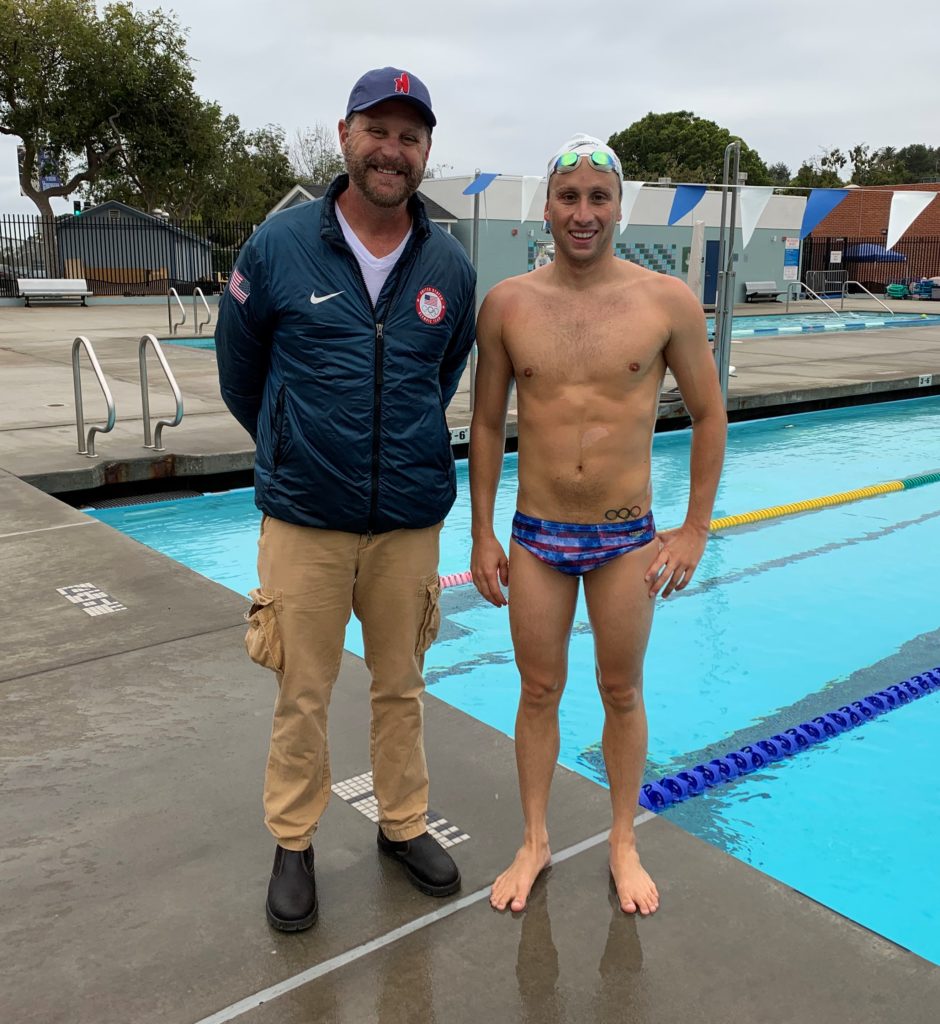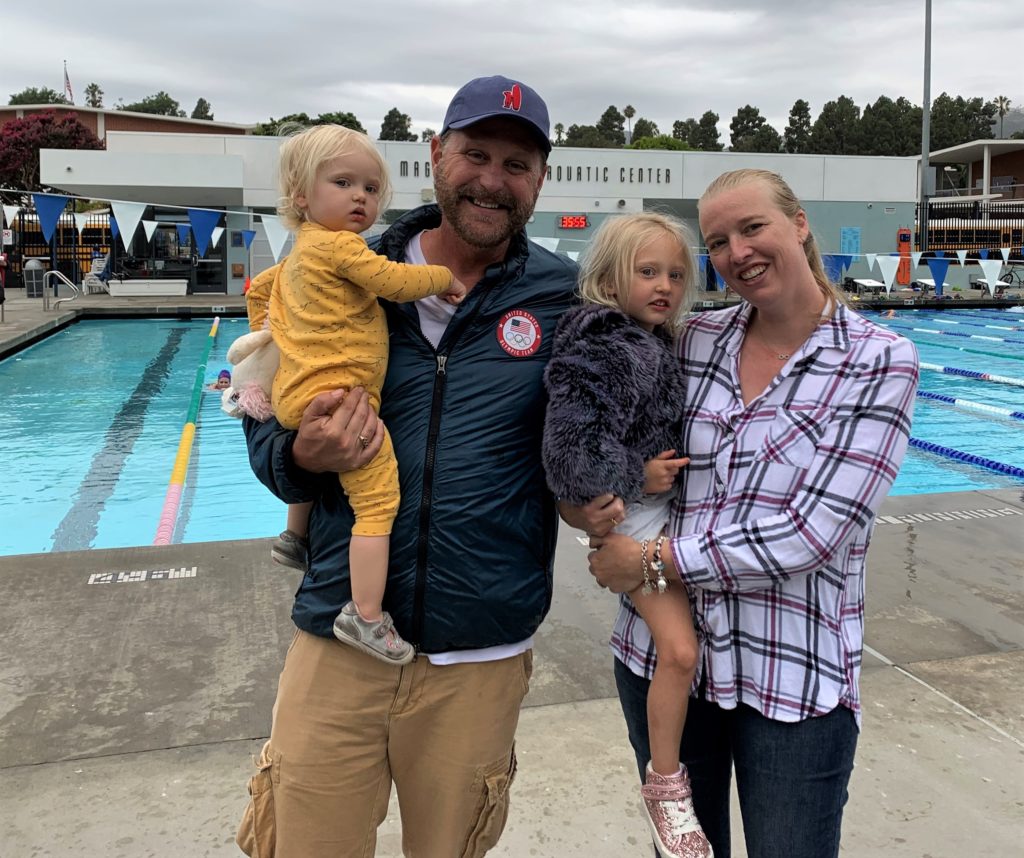Double. Single. Double. Single. Double. Single. Sunday off. That’s the seven-day pool training schedule for Olympic swimmers.
Local swimming coach David Kelsheimer works with world-class athletes and is currently training six to eight athletes who are middle distance and distance swimmers. The group includes Jordan Wilimovsky, who finished fourth in the 1,500 meters and fifth in the 10K open-water marathon at the 2016 Rio Olympics, and swimmers from China, Australia, the United Kingdom and Israel.
During a practice session at the Maggie Gilbert pool at Palisades High School, Kelsheimer offered tips to his athletes as they swam for almost two hours straight.
Kelsheimer was recruited by Team Santa Monica parents after he coached in the Cayman Islands (two of his former Cayman swimmers, Shaune and Brett Fraser, were University of Florida standouts and three-time NCAA champion Shaune received more All-American honors than any other athlete in school history) and then at the Surrey Park Swim Club in Melbourne, Australia.
While coaching in Australia, Kelsheimer’s team took the FINA 10K World Cup medal in Roberval, Canada and his open-water swimmers won the Australian national championship three years in a row.
In 2010, he started coaching Wilimovsky (who lived in the Sunset Mesa neighborhood near the Getty Villa and started his swimming career on the YMCA Swim Team in Temescal Canyon) and was the assistant open-water swimming coach for the 2016 U.S. Olympic team.
Kelsheimer is currently taking a break as CEO of Team Santa Monica because “I’m focusing on world championship or better athletes,” he said. “Jordan is the first male athlete in all sports to qualify for the 2020 Olympics [in Japan].”
Wilimovsky is the fifth swimmer he has coached to be an Olympian. “High performance athletes are part of a small community,” Kelsheimer said, “and people know everyone’s history.”
“I enjoy working with high performing individuals who are intelligent. None of the people I work with have the ‘punch the clock’ and ‘show up’ mentality. They’re not robots; there’s always a degree of respecting their need to understand what they’re doing,” he said.
During his 25-year career, Kelsheimer said, he has met a lot of coaches with a lot of theories that are not founded in actual experience. “My experience is firsthand.”
He explained that top-flight swimming is about the aggregate of marginal gains and he works with athletes to improve times by fractions. “The sport is measured in hundreds of seconds,” Kelsheimer noted. “A gold medal is decided by hundreds of seconds.”
World-class swimmers perform double practices three times a week. They start the practice with dryland training, which takes at least 20 minutes before they start two hours in the pool. Afterwards, it’s another 20 minutes on the deck. Swimmers have strength training on the days they only have a single pool workout. Once a week the athletes have a physical therapy session.
“Everything is designed to maximize training for athletes to make them faster and stronger,” Kelsheimer said. “We know that 99 percent of the best do doubles, singles and take Sunday off. “If it could be done with less time in the pool, I’d do it. But I can’t.
“A really good sports psychologist once said to a group I was coaching, ‘It is about optimal effort, not necessarily maximal effort.’ “I translated that to mean not just going hard but going efficiently.”
He used the example of a golfer teeing up and trying to hit the ball as hard as he could—it would not necessarily mean it would produce the best drive.
Kelsheimer said that a lot of young coaches might be surprised to find that Olympic coaches are constantly asking questions from others about training. “Our goal is to steal another piece of puzzle,” he said.
Is there an optimal time to start rigorous training? Generally, “eleven and a half for girls and 13 for boys,” he said.
Kelsheimer also has another passion–teaching swimming to infants starting at three months of age. “Making sure little kids can swim is as important as getting gold medals,” he said.
From world-class athletes to infants was a natural progression for Kelsheimer, because he has two young daughters. He is married to Dr. Ashley Bateman, who grew up in Pacific Palisades.
“I started K-swim because there was no swim school, I could find at a standard I wanted for my children,” said Kelsheimer, who runs his program at the Griffen Club in Cheviot Hills.
On Saturdays he coaches world-class swimmers and afterwards teaches parent-and-me classes because “It’s important that my instructors see how I want things done,” he said.
How did he get into coaching? “This just sort of took over,” he said, recalling that he learned to swim at a YMCA in Illinois because “my mother couldn’t.” The captain of his high school swim team recommended him as a coach for younger swimmers, which started him on this career path.
Kelsheimer attended Wayne State and then the University of Michigan where he studied psychology. He didn’t swim at Wayne State because he was a full-time coach for a club team in metro Detroit.
In 2015, Kelsheimer won the Glen Hummer Award and was nominated for Coach of Year by USA Swimming (the Golden Goggles Award). In the summer of 2016, he sent four swimmers to the U.S Olympic Trials.
Today, you can find him at the pool, with his athletes, who he sometimes reminds, “I’m just a coach, not their parent, a priest, or a psychologist. If they can’t get into the water, swim back and forth, I can’t help them.”



So proud of him!! He is truly a great guy!!
Well done . Lovely guy very focused and committed . So happy he’s married now and has a young family . He used to stay with us in the UK in the past . Wishing you all the best David and family .